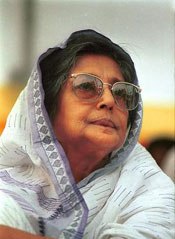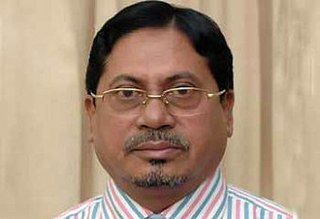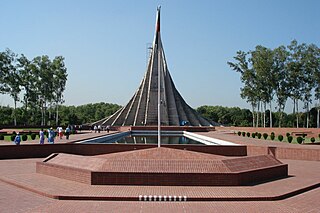Related Research Articles

Jahanara Imam was a Bangladeshi writer and political activist. She is known for her efforts to bring those accused of committing war crimes in the Bangladesh Liberation War to trial. She has been called "Shaheed Janani".
Abu Naser Muhammad Gaziul Haque was a language activist and an activist leader during the Bengali Language Movement.

Muhammad Kamaruzzaman was a Bangladeshi politician and journalist who served as the senior assistant secretary general of Bangladesh Jamaat-e-Islami and was convicted of war crimes during the 1971 Liberation war of Bangladesh. He was executed by hanging at Dhaka Central Jail at 22:01 on 11 April 2015.
Ekattorer Dingulee is an autobiography by martyr-mother Jahanara Imam based on her experiences of the liberation war of Bangladesh in 1971.

Muntasir Mamoon his full name is Muntasir Uddin Khan Mamun, he is a Bangladeshi writer, historian, scholar, secularist, translator, and professor at University of Dhaka. He was awarded Bangla Academy Literary Award and Ekushey Padak by the government of Bangladesh.

Shahriyar Kabir is a Bangladesh journalist, filmmaker, human rights activist, and author of more than 70 books focusing on human rights, communism, fundamentalism, history, and the Bangladesh war of independence. He was awarded Bangla Academy Literary Award in 1995.
There is a history of persecution of Muslims in Myanmar that continues to the present day. Myanmar is a Buddhist majority country, with significant Christian and Muslim minorities. While Muslims served in the government of Prime Minister U Nu (1948–63), the situation changed with the 1962 Burmese coup d'état. While a few continued to serve, most Christians and Muslims were excluded from positions in the government and army. In 1982, the government introduced regulations that denied citizenship to anyone who could not prove Burmese ancestry from before 1823. This disenfranchised many Muslims in Myanmar, even though they had lived in Myanmar for several generations.

There have been numerous works of art created as a result of the Bangladesh Liberation War. In 1971, a concert was organized by members of the British rock band, The Beatles, in support of Bangladesh. The songs recorded for and broadcast on Swadhin Bangla Betar Kendra are still considered to be the best of Bangladeshi protest songs.
1992 (MCMXCII) was a leap year starting on Wednesday of the Gregorian calendar, the 1992nd year of the Common Era (CE) and Anno Domini (AD) designations, the 992nd year of the 2nd millennium, the 92nd year of the 20th century, and the 3rd year of the 1990s decade.
Kabir Chowdhury was a Bangladeshi academic, essayist, materialist, translator, cultural worker and civil society activist.

The movement demanding trial of war criminals is a protest movement in Bangladesh, from 1972 to present demanding trial of the perpetrators of 1971 Bangladesh genocide during the Bangladesh Liberation War from Pakistan.
Gono Adalat was a mock trial held to Bangladesh of those responsible for the 1971 Bangladesh Genocide. It was not an official trial and did not have any legal basis but was widely popular. The Bangladesh Nationalist Party led government filed cases against the organizers of the Gono Adalat which were withdrawn by the next caretaker government. The trial was led by Jahanara Imam.
Shahadat Chowdhury was a Bangladeshi journalist and editor of several news magazines. He served as the editor of Weekly Bichitra from 1972 until its publication was ceased in 1997. He then served as the editor of Shaptahik 2000 and Anandadhara.
White Paper: 2000 Days of Fundamentalist and Communal Violence in Bangladesh is a white paper published in February 2022 by the People's Commission to Investigate radical and communal Terrorism in Bangladesh. To investigate the communal attacks and religious frenzy that took place in Bangladesh in February–March 2021, this public commission was formed by the joint initiative of the Ekattorer Ghatak Dalal Nirmul Committee and the Tribal and Minority Affairs Caucus of the Jatiya Sangsad. In this white paper, 116 speakers associated with Islamist organizations and institutions are termed as 'religion traders' by raising various charges including financing of militants, spreading hatred, money laundering, communal terrorism, irregularities, corruption, extorting money in the name of Waz, and 1,000 madrassas under Hefazat-e-Islam Bangladesh were accused of radicalization. The 2,200-page investigation report has also mentioned the names of various religious groups including Hefazat and administrative officials including DC, OC who helped them and encouraged communal violence. The recommendation of the Swetpatra emphasized on filing a case against them. After the Swetpatra was submitted to the Anti-Corruption Commission and the National Human Rights Commission on May 12, 2022, there was extensive discussion about it. Home Minister Asaduzzaman Khan said that the People's Commission has no basis. The day the Swetpatra was submitted, Islamic parties and organizations protested against it.
Mizanur Rahman Bhuiyan was a justice on the High Court Division of Bangladesh Supreme Court.
The following is a list of scheduled and expected events for the year 2024 in Bangladesh. 2024 (MMXXIV) is the current year, and is a leap year starting on Monday of the Gregorian calendar, the 2024th year of the Common Era (CE) and Anno Domini (AD) designations, the 24th year of the 3rd millennium and the 21st century, and the 5th year of the 2020s decade.
Tureen Afroz is a Bangladeshi lawyer and former senior prosecutor of the International Crimes Tribunal. She was removed from the tribunal after allegedly meeting accused war criminal Mohammad Wahidul Haque. She prosecuted cases against Ali Ahsan Mohammad Mojaheed, Ghulam Azam, Muhammad Kamaruzzaman, Motiur Rahman Nizami, and Salauddin Quader Chowdhury.
Chowdhury Rafiqul Abrar, also known as C. R. Abrar, is a retired professor of International relations of the University of Dhaka, human rights activist, and executive director of Refugee and Migratory Movements Research Unit. He is the president of Odhikar, a human rights organization.
Mohammad Gholam Rabbani was a judge of the Appellate Division of Bangladesh Supreme Court.
References
- ↑ "Establishing secularism still a challenge". The Daily Star. 2019-06-27. Retrieved 2023-01-09.
- ↑ Shehabuddin, Elora (15 August 2008). Reshaping the Holy: Democracy, Development, and Muslim Women in Bangladesh. Columbia University Press. p. 67. ISBN 978-0231141574.
- ↑ Refugees, United Nations High Commissioner for. "Refworld | Bangladesh: Ghatak Dalal Nirmul Committee; its existence in Dhaka; its structure; whether it is national; its aims and objectives; and how it is viewed by the authorities". Refworld. Retrieved 2022-04-22.
- ↑ "Jahanara Imam's 19th death anniversary today". The Daily Star. 2013-06-26. Retrieved 2023-01-09.
- ↑ Wemyss, Georgie (1 December 2009). The invisible empire: white discourse, tolerance and belonging. Ashgate. ISBN 978-0754673477.
- 1 2 Kibria, Nazli (15 May 2011). Muslims in Motion: Islam and National Identity in the Bangladeshi Diaspora. Rutgers University Press. pp. 104–105. ISBN 978-0813550565.
- ↑ "'Khaleda still loyal to Pakistani forces'". The Daily Star. 2015-12-22. Retrieved 2023-01-09.
- ↑ "'Endorse Liberation War Denial Crimes Act'". The Daily Star. 2016-01-28. Retrieved 2023-01-09.
- ↑ "Europe chapter of Ghatak Dalal Nirmul Committee formed". The Daily Star. 2016-04-03. Retrieved 2023-01-09.
- 1 2 3 "Shahriar president, Mukul GS of Ghatak Dalal Nirmul Committee". The Daily Star. 2017-01-21. Retrieved 2023-01-09.
- ↑ "Nirmul Committee urges UN to resettle Rohingya refugees in another country". The Daily Star. 2020-09-20. Retrieved 2023-01-09.
- ↑ "Nirmul Committee collects 10,000 Rohingya testimonies". The Daily Star. 2020-09-21. Retrieved 2023-01-09.
- ↑ "'Punish culprits who dug up baby's grave'". The Daily Star. 2020-07-12. Retrieved 2023-01-09.
- ↑ "Free Hriday Mondal". The Daily Star. 2022-04-08. Retrieved 2023-01-09.
- ↑ "Hriday Mondal: Run judicial enquiry into the incident". The Daily Star. 2022-04-16. Retrieved 2023-01-09.
- 1 2 3 "116 Islamic speakers: ACC to decide on enquiry after review of 'white paper'". The Daily Star. 2022-06-24. Retrieved 2023-01-09.
- ↑ ""Relieve us of this nightmare": Plead those accused in DSA cases". The Daily Star. 2022-06-12. Retrieved 2023-01-09.
- ↑ Murshid, Tazeen M. (2001). "State, Nation, Identity: The Quest for Legitimacy in Bangladesh". In Shastri, Amita; Jeyaratnam Wilson, A. (eds.). The Post-Colonial States of South Asia: Political and Constitutional Problems. Curzon Press. p. 170. ISBN 978-1-136-11866-1.
- ↑ Mookherjee, Nayanika (26 November 2009). Sharika Thiranagama, Tobias Kelly (ed.). Traitors: Suspicion, Intimacy, and the Ethics of State-Building. University of Pennsylvania Press. p. 54. ISBN 978-0812242133.